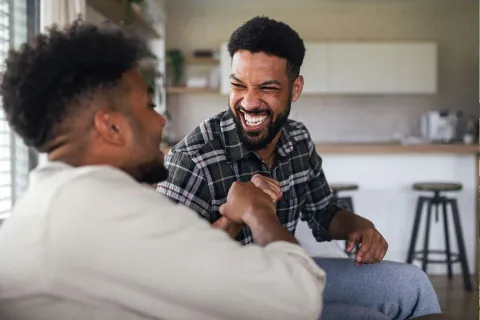How men can better support each other’s mental health

Men are often urged to talk about their mental health with friends, but what does that involve?
This week, researchers from the Men’s Health Research Program at UBC introduced In Good Company, a website and podcast series aimed at answering precisely that question. The website provides practical advice for men seeking to make new connections, strengthen existing relationships and provide mutual support. The podcast series interviews men’s health experts and psychologists to explore the nuances and benefits of authentic male connection.
In this Q&A, Dr. Paul Sharp, a senior lecturer at the University of New South Wales and researcher with the men’s health program, and Dr. John Oliffe, the program’s lead researcher and a Professor of Nursing at UBC, discuss the inspiration behind these initiatives and offer tips for supporting mental health.
Why is protecting men’s mental health important?
Oliffe: Every year, one in five men struggle with mental health challenges, yet many hesitate to get professional help. They often feel uneasy discussing their concerns with their healthcare providers for fear of being judged. Societal expectations of male strength and self-reliance can make seeking help seem like a sign of weakness. As a result, many men avoid seeking support altogether or drop out from services that fail to resonate with them. This lack of support can worsen mental health issues, leading to higher risks of depression, anxiety and suicide among men, who make up 75 per cent of all suicide deaths worldwide. Mental health services must cater more effectively to men’s needs.
How will In Good Company help men face these challenges?
Sharp: The website offers practical tips on starting conversations with friends about a range of issues, from fatherhood to divorce to substance use. It suggests ways to reconnect with old buddies and navigate difficult times, reminding men that reaching out is a positive step and that their friends do want to help.
The podcast explores these issues in greater depth, with new episodes every two weeks that draw from my research on male social connections. Each episode features guest speakers sharing their expertise and life lessons.
Oliffe: These resources were inspired by our recent photovoice project, where we asked 65 men ages 19-78 from across Canada to take photos depicting their experiences with social connections and mental health challenges. The stories that emerged were raw and revealing—from local pubs to mountaintops, men shared stories of connecting, bonding and helping each other out, as well as instances where peer support fell short. The men overwhelmingly wanted stronger connections and more support from their peers. Their experiences and insights are integrated into the website. It’s as real as it gets.
How important is peer support for men confronting different challenges?
Sharp: Peer influence can be powerful in driving change. You already see this in groups like Alcoholics Anonymous. Our photovoice research and a related study suggest that informal peer networks—one’s circle of friends—can be just as influential and supportive. Unfortunately, the importance of informal peer support in promoting mental health has often been overlooked. While men are encouraged to open up, there’s been limited guidance in how to do so effectively. That’s the gap we aim to fill with In Good Company.



